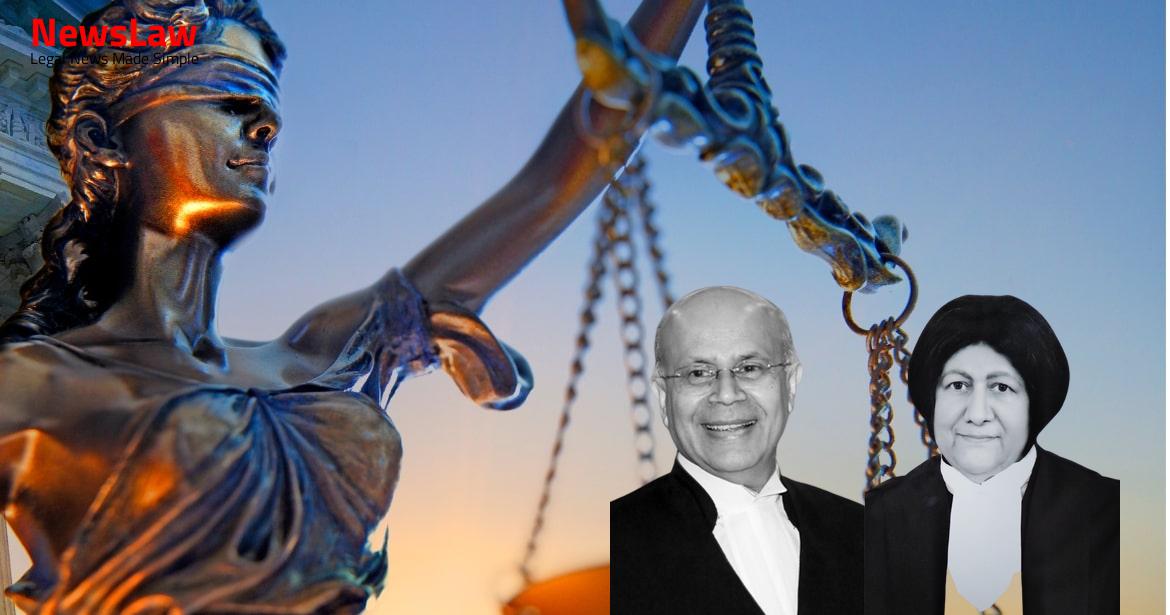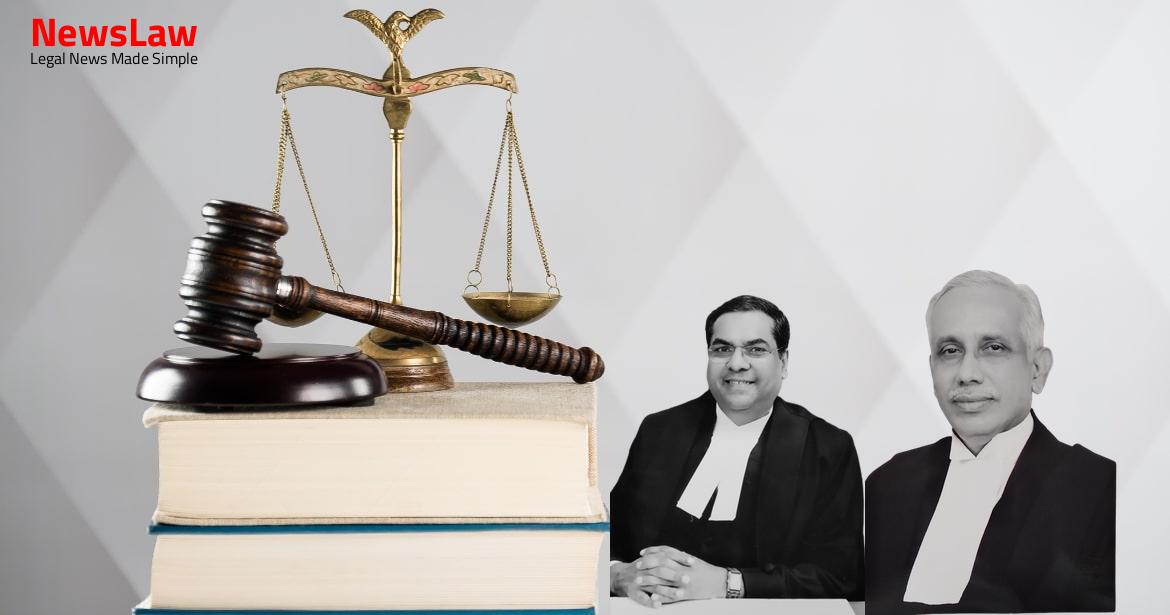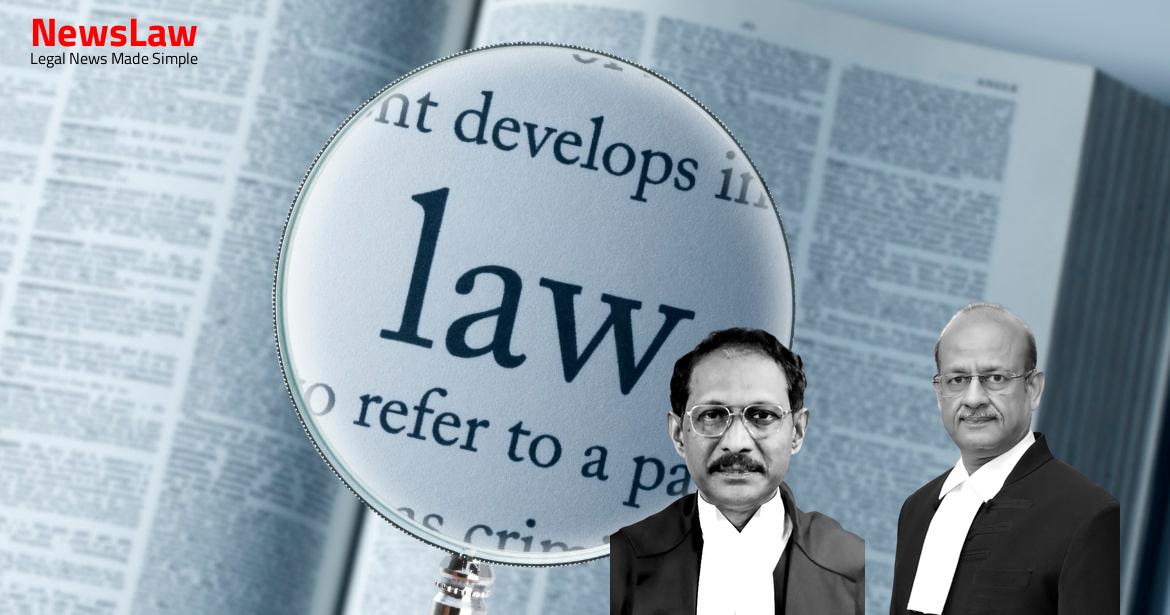Explore the nuanced legal analysis surrounding the extension of the Director of Enforcement’s tenure, focusing on statutory provisions, judicial judgments, and key considerations laid down by the court. By examining the application of relevant laws and principles, this case summary sheds light on the complexities involved in ensuring the independence and integrity of enforcement agencies.
Facts
- Writ Petition filed under Article 32 of the Constitution of India to quash the order dated 13.11.2020 extending the tenure of Respondent No.2 as Director of Enforcement.
- Petition seeks direction for the appointment of Director of Enforcement as per the procedure under the Central Vigilance Commission Act, 2003.
- Respondent No.2 was appointed as Director of Enforcement on 19.11.2018 for a period of two years, extendable until further orders.
- Office order on 13.11.2020 amended the appointment period to three years by the President of India.
Also Read: Legal Analysis on Seniority Fixation in Contempt Petitions
Arguments
- The Petitioner, through Mr. Dave, argued that the Director of Enforcement’s duties involve supervising crucial investigations and hence his tenure cannot be extended periodically, especially under the guise of pending cross-border investigations.
- The tenure of the second Respondent was extended from two to three years on 13.11.2020, despite reaching superannuation in May, 2020, which according to Mr. Dave, should not have been done without consent from the Committee.
- Mr. Dave emphasized on Fundamental Rule 56, stating that there cannot be any extension of service for the Director of Enforcement, as per the rule. He argued against any exceptions for extensions of officers not mentioned in the rule.
- The Petitioner challenged the validity of the order extending the tenure of the second Respondent, alleging that it was done for extraneous considerations and had malice in law.
- Mr. Dave contended that even if the second Respondent’s tenure could be extended, it should not have been for one year when the original appointment was for two years.
- The argument also included references to the CVC Act, highlighting the minimum two-year tenure provision to ensure independent functioning of the Director of Enforcement without executive interference, echoing the principles laid down in Vineet Narain case.
- While acknowledging the absence of a specific provision for extending the Director’s tenure in Section 25, it was argued that the Union of India could still extend it using Section 21 of the General Clauses Act, as per the Solicitor General’s defense.
- The Union of India countered the contentions raised in the Writ Petition, stating that the CVC Act sets a minimum tenure for the Director of Enforcement and justified the extension of the second Respondent’s tenure based on a valid recommendation by the appointed Committee.
- Mr. Narasimha, representing the Central Vigilance Commission, also participated in the hearing.
- Arguments revolved around the strict interpretation of Section 25(d) of the CVC Act, eligibility criteria for extension of tenure, and the power of the Central Government to appoint officers like the Director of Enforcement.
- Various legal judgments were cited by both sides to support their arguments, including cases related to the General Clauses Act, modifications of appointments, and procedures prescribed by statutes.
- The Solicitor General raised a preliminary objection on the maintainability of the Writ Petition in public interest, claiming the second Respondent’s ineligibility for an extension due to age superannuation in May, 2020.
- The extension of the tenure of the second Respondent was not based on individual whims but on recommendations by a High Level Committee.
- Important investigations supervised by the second Respondent are at a crucial stage, warranting his continuance for one more year as per the Committee’s opinion.
- No allegations have been made against Respondent No.2 in the discharge of his duties.
- The Solicitor General argued that malice in law is not a relevant consideration in this case.
- The extension of the second Respondent’s tenure is deemed a bona fide exercise of power for relevant considerations.
Also Read: Analysis of Authorization and Limitation in Filing Section 7 Application
Analysis
- Section 25 (d) of the CVC Act mandates a minimum tenure of two years for the Director of Enforcement.
- Extension of tenure beyond two years is permissible in certain cases to ensure continuity in crucial investigations.
- The appointment and extension of tenure must adhere to the recommendations of the Independent Review Committee and previous judicial judgments.
- The power to extend tenure is not restricted by Section 25 (f) of the CVC Act, allowing for appointments exceeding two years.
- Fundamental Rule 56 does not restrict extensions beyond the age of 60 for specific posts, such as Director of Enforcement.
- The General Clauses Act can be invoked for necessary amendments or variations in appointment orders as per Section 21.
- Extension of tenure must be in line with the purpose of securing independence and integrity within enforcement agencies.
- Any extension of tenure should not be for unauthorized purposes and must uphold the principles of minimum tenure duration as specified in relevant laws.
- The importance of security of tenure for certain positions like Director of Enforcement is emphasized for maintaining integrity in investigations.
- In State of Bihar v. D. N. Ganguly & Ors., it was held that Section 21 of the General Clauses Act does not apply to reconstitution of a Commission under the Commissions of Inquiry Act.
- An industrial dispute was referred for adjudication, and the time for making the award was extended through a notification. In Strawboard Manufacturing Co., it was held that such extension was without jurisdiction.
- Section 21 of the UP General Clauses Act was held not to have retrospective operation.
- In Vineet Narain, it was held that Section 21 of the General Clauses Act does not permit retrospective orders.
- Kamla Prasad Khetan dealt with an amendment to authorization of management takeover, where the power to amend was held to be valid under Section 21 of the General Clauses Act.
- It was observed that the rule in Section 21 must be applied considering the context and subject-matter of the statute in question.
- Government servants must retire at the age of 60, as per Fundamental Rule 56.
- Exceptions for extension of service beyond 60 years are specified for certain posts, not including the post of Director of Enforcement.
- Section 25 mandates a Director of Enforcement to serve for a minimum of two years.
- The appointment of officers in the Directorate of Enforcement is governed by specific procedures outlined in the Central Vigilance Commission Act.
- The General Clauses Act empowers the Director of Enforcement to issue, amend, vary or rescind notifications, orders, rules, or bye-laws.
- The purpose of the General Clauses Act is to provide uniformity, simplify language, and ensure proper interpretation of Central Acts.
- Section 21 of the General Clauses Act cannot vest power by necessary implication.
- The rule in Section 21 of the General Clauses Act applies only when the subject matter, context, and effect of the provisions are not inconsistent with such application.
- The judgment in Kazi Lhendup Dorji v. Central Bureau of Investigation & Ors. supports the argument that Section 21 of the General Clauses Act is not applicable to Section 25 of the CVC Act.
- Extension of tenure for the Director of Enforcement beyond the period of two years is upheld.
- Extensions for officers who have reached superannuation age should be rare and exceptional.
- Reasons must be recorded by the Committee under Section 25(a) of the CVC Act for granting extension.
- Extensions should only be for a reasonable period to finish ongoing investigations.
- Any extension for a Director of Enforcement post-superannuation should be short.
Also Read: Judicial Review of Selection Process for DGP Appointment
Decision
- Extension of tenure of the second Respondent will not be interfered with as his tenure is ending in November, 2021.
- No further extension will be granted to the second Respondent.
- The Writ Petition is dismissed with the above observations.
Case Title: COMMON CAUSE (A REGISTERED SOCIETY) Vs. UNION OF INDIA (2021 INSC 459)
Case Number: W.P.(C) No.-001374 / 2020



